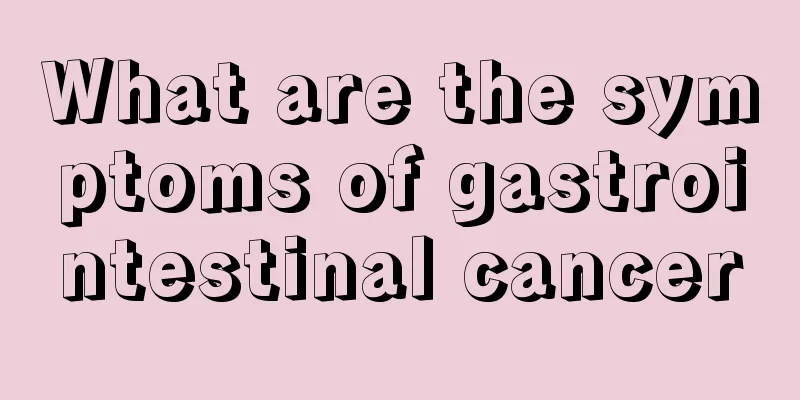What are the symptoms of gastrointestinal cancer

|
Symptoms of gastrointestinal cancer may vary depending on the location and severity of the lesion, but include rapid weight loss, loss of appetite, indigestion, persistent stomach pain, blood in the stool, anemia, etc. If you have similar symptoms, you should see a doctor as soon as possible for screening and diagnosis. 1 Rapid weight loss Patients with early-stage gastrointestinal cancer may lose weight significantly in a short period of time due to reduced food intake or tumors consuming a large amount of nutrients. Rapid weight loss is often a warning sign of multiple health problems. You can choose to have a timely gastroscopy or colonoscopy, blood tumor markers, etc. to rule out the possibility of gastrointestinal cancer. 2. Persistent stomach discomfort and pain Persistent stomach pain or discomfort is one of the typical symptoms of gastrointestinal cancer. This pain is usually located in the upper abdomen, may worsen over time, and is not related to dietary patterns. The pain may be caused by the tumor compressing or irritating the nerves of the gastrointestinal tissue. If this type of discomfort persists for a long time, you should immediately consult a gastroenterologist for examinations such as X-rays and endoscopy. 3 Abnormal digestive system symptoms Patients with gastrointestinal cancer may experience long-term indigestion, repeated nausea and vomiting, abdominal distension, constipation or diarrhea, etc. Gastrointestinal tumors may directly affect digestive function and interfere with normal food digestion and excretion. The occurrence of such symptoms should not be ignored and timely medical treatment should be sought to determine the cause. 4 Occult blood in stool or anemia Early gastrointestinal cancer can easily lead to mild gastrointestinal bleeding, which is often manifested as dark stool or occult blood, which may not be noticed by the patient, leading to chronic anemia, fatigue, pale complexion and other symptoms. Fecal occult blood detection is of great significance for the early detection of gastrointestinal cancer. 5. Loss of appetite and early satiety Tumors may hinder the normal expansion of the gastrointestinal tract or the process of swallowing food, which may cause a significant decrease in appetite and a feeling of fullness after eating a small amount. Such symptoms can easily be mistaken for ordinary dietary problems, but if they persist for a long time, you need to be alert to the risk of gastrointestinal diseases. 6. Lumps or abnormal sensations Patients with advanced gastrointestinal cancer may feel a mass on the surface of the body or in the abdominal cavity, or experience an abnormal obstruction in the passage of food during meals. This is usually a signal of a more serious stage of the disease and requires immediate comprehensive examination. If you experience one or more of the above symptoms, you should be highly alert to the possibility of gastrointestinal cancer. Early diagnosis and treatment can significantly increase the chance of cure. In daily life, it is important to maintain a healthy lifestyle, a balanced diet, and regular physical examinations, especially for high-risk groups such as those with a family history or those over 40 years old. |
<<: Chest pain, early symptoms of breast cancer
>>: Early symptoms of gastrointestinal cancer
Recommend
Can squats improve sexual performance?
Many people usually have the habit of fitness. Th...
Is daily cough a hot cough or a cold cough?
Coughing during the day is also very common in da...
What are the precautions for upper gastrointestinal tract barium meal radiography
Upper gastrointestinal tract barium meal radiogra...
What are the side effects of Acanthopanax?
Acanthopanax is a relatively common Chinese herba...
What should I do if my foot joints hurt when using air conditioning?
In the hot summer, air conditioners have become a...
How much does a testicular cancer reexamination cost?
How much does a testicular cancer follow-up exami...
How to care for primary bronchogenic lung cancer Routine care for primary bronchogenic lung cancer
In fact, what we usually call lung cancer is bron...
Eyes itch at night
Sometimes our eyes feel itchy, but if we rub them...
How to extract essential oil from roses?
Rose is a very famous flower in our life. It has ...
Anti-inflammatory medicine urine foam
Normally when going to the toilet, people seldom ...
How much does a cervical cancer smear screening cost
When it comes to diseases suffered by women, we s...
Cancer viruses are most likely to show their true colors here
1. There are "black moles" on the toes ...
Can liver cancer be transmitted through oral sex?
Because many viral hepatitis are contagious, many...
Aftereffects of eye bag surgery
Every woman wants to have a beautiful face, but s...
Anxiety and chest tightness
Some friends experience chest regurgitation when ...









